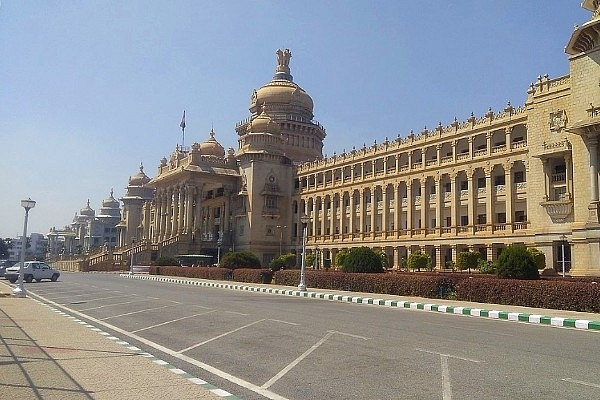Politics
Mahadayi River Water Dispute: Bandh Slows Karnataka, But To What Effect?
- Over the years, several negotiations have taken place to resolve the Mahadayi river water dispute amicably, but a solution to the conflict has proved evasive.
- The bandh is likely to effect little change, but the Congress and the BJP may find in it an opportunity to make an impression on the voter ahead of the elections.

(Representational image) Karnataka state assembly in Bengaluru (Tharun Masarp/Wikimedia Commons)
There is an air of calm today (25 January) on the streets of what is otherwise a buzzing Indian metropolis. Bengaluru, as all of Karnataka, is mostly home and around today because of the bandh that has been called on by several pro-Kannada outfits, who are hoping to draw the centre’s attention to a river water dispute that the South Indian state has with Goa.
The state-wide bandh is in response to Bharatiya Janata Party (BJP) president Amit Shah’s visit to attend a public meeting in Mysuru, the protesting outfits claim. Which is also the reason why 4 February is bracing for a bandh, albeit only in Bengaluru, when Prime Minister Narendra Modi is scheduled for a visit to the city. This has led the BJP to claim that the Congress is behind the manufacturing of this shutdown.
It’s not surprising that the two parties are butting heads now since the Karnataka assembly elections this year are approaching fast; naturally, each party will be looking to inch ahead of the other on the back of sensitive political matters such as the Mahadayi river water sharing dispute.
The river Mahadayi is a small one, flowing through the states of Karnataka and Goa. It originates at Bhimghad in Karnataka’s Belagavi district and makes its way to the Arabian Sea, passing by Goa’s capital, Panaji, along the way. It covers a 111 km stretch, with over two-thirds of its presence in Goa. People in the border areas of Karnataka, Goa and Maharashtra rely on the river’s water for their needs.
The trouble began when Karnataka demanded the diversion of 7.56 thousand million cubic feet of river water to account for its drinking water needs in Dharwad, Belagavi, Bagalkot and Gadag districts, among the more arid and water-scarce regions in the country. The work on the project took off under chief minister S M Krishna. However, the western state was not interested. Goa sought redressal through a tribunal in 2002 and in 2006, approached the Supreme Court to put a stop to the project, citing ecological reasons. It claims that the project would come at the cost of 700 hectares of forest and some 60,000 trees, according to a News18 report.
A Mahadayi Water Disputes Redressal Tribunal was constituted in 2010 in the hope of a resolution. It later passed an (interim) order for the cancellation of the project, sparking protests. Over the years, several negotiations have taken place to resolve the matter harmoniously, but a solution to the conflict has evaded the concerned parties.
In January this year, Goa filed its arguments before the tribunal, maintaining its stance to not share water with Karnataka over ecological concerns. The tribunal, on their part, has continued to express its desire for the chief ministers of the states to resolve the matter amicably.
Will today’s bandh help the states to arrive at a solution? In all likelihood, no. But then, the two major parties in the state will be hoping to leave an impression on the voter ahead of the elections this year, even as the issue tries to free itself from a decades-old shackle.
---
At the time of writing, the Karnataka bandh is near-total in Bengaluru, Mysuru and Dharwad, Belagavi, Bagalkot and Gadag districts. Bus services has been affected, schools, colleges and offices are closed, and so are shops. Bengaluru has witnessed forced shutdown of a few shops and eateries, revealed the Hindu’s reporting. Protests have kicked off in some pockets, like the Town Hall and Freedom Park, but the police presence, estimated to be about 15,000, has been on the job to keep things under control since morning.
In other regions of Karnataka, like near the coast, the bandh has evoked a lukewarm response and daily life has been minimally affected.
Support Swarajya's 50 Ground Reports Project & Sponsor A Story
Every general election Swarajya does a 50 ground reports project.
Aimed only at serious readers and those who appreciate the nuances of political undercurrents, the project provides a sense of India's electoral landscape. As you know, these reports are produced after considerable investment of travel, time and effort on the ground.
This time too we've kicked off the project in style and have covered over 30 constituencies already. If you're someone who appreciates such work and have enjoyed our coverage please consider sponsoring a ground report for just Rs 2999 to Rs 19,999 - it goes a long way in helping us produce more quality reportage.
You can also back this project by becoming a subscriber for as little as Rs 999 - so do click on this links and choose a plan that suits you and back us.
Click below to contribute.
Latest